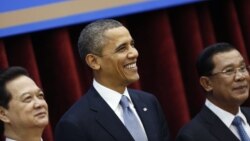There are more than 20 million victims of human trafficking around the world. The United States, along with its partners, is committed to ending this scourge, also known as modern slavery.
During the recent Association of Southeast Asian Nations, or ASEAN, Leaders’ Meeting, President Barack Obama and the ten ASEAN heads of state agreed to improve cooperative efforts to tackle modern slavery, including the forced labor and trafficking of women, men, and children.
The United States agreed to harmonize legal frameworks in defining and prohibiting trafficking, increase joint cross-border investigation, and develop a standardized response to the needs of trafficking victims. To achieve these objectives, the U.S. has pledged $500,000 in technical assistance and training for ASEAN and its members.
This new commitment complements existing U.S. programs in countries like Cambodia, where the U.S. works with the government and civil society to provide psychological support and other services to address trauma and mental health needs of victims of sex and labor trafficking. Assistance also helps trafficking victims receive training and job placement.
In the Philippines, the U.S. helps fund victim support activities, which makes prosecution efforts more effective and increases conviction rates. The programs support awareness campaigns as well as comprehensive protective services to trafficking victims to ensure they gain new life skills and reduce their vulnerability to re-trafficking.
In Vietnam, U.S.-funded efforts have led to valuable research on victim protection and prosecution procedures.
The U.S. and Burma announced a new joint plan to counter trafficking in persons, which will include the establishment of a formal, senior-level dialogue. The United States is committed to enhancing Burma’s progress through the sharing of technical knowledge and best practices, ushering in a new era of U.S.-Burma cooperation. Areas of cooperation, among others, include identifying trafficking offenses, investigating and prosecuting trafficking offenders and preventing Burmese citizens from being subjected to sex trafficking or forced labor either at home or abroad.
The fight against human trafficking is one of the great human rights causes of our time, said President Obama, and the United States will continue to lead it.
During the recent Association of Southeast Asian Nations, or ASEAN, Leaders’ Meeting, President Barack Obama and the ten ASEAN heads of state agreed to improve cooperative efforts to tackle modern slavery, including the forced labor and trafficking of women, men, and children.
The United States agreed to harmonize legal frameworks in defining and prohibiting trafficking, increase joint cross-border investigation, and develop a standardized response to the needs of trafficking victims. To achieve these objectives, the U.S. has pledged $500,000 in technical assistance and training for ASEAN and its members.
This new commitment complements existing U.S. programs in countries like Cambodia, where the U.S. works with the government and civil society to provide psychological support and other services to address trauma and mental health needs of victims of sex and labor trafficking. Assistance also helps trafficking victims receive training and job placement.
In the Philippines, the U.S. helps fund victim support activities, which makes prosecution efforts more effective and increases conviction rates. The programs support awareness campaigns as well as comprehensive protective services to trafficking victims to ensure they gain new life skills and reduce their vulnerability to re-trafficking.
In Vietnam, U.S.-funded efforts have led to valuable research on victim protection and prosecution procedures.
The U.S. and Burma announced a new joint plan to counter trafficking in persons, which will include the establishment of a formal, senior-level dialogue. The United States is committed to enhancing Burma’s progress through the sharing of technical knowledge and best practices, ushering in a new era of U.S.-Burma cooperation. Areas of cooperation, among others, include identifying trafficking offenses, investigating and prosecuting trafficking offenders and preventing Burmese citizens from being subjected to sex trafficking or forced labor either at home or abroad.
The fight against human trafficking is one of the great human rights causes of our time, said President Obama, and the United States will continue to lead it.






